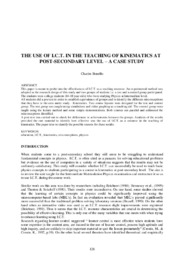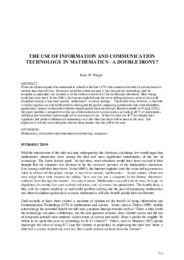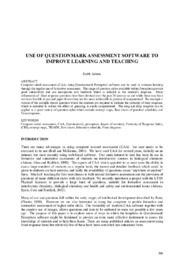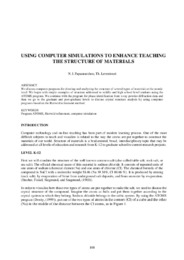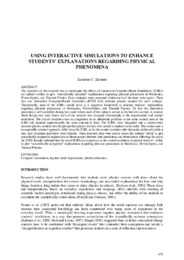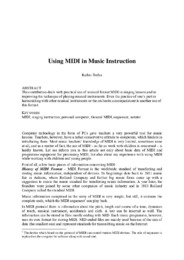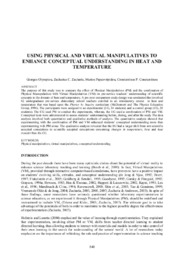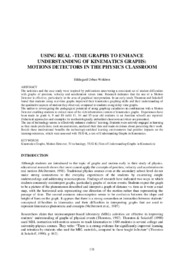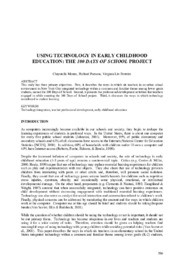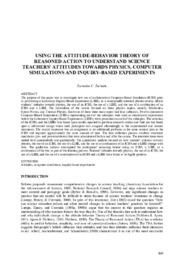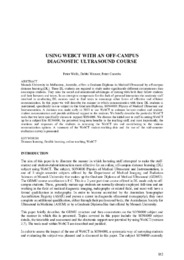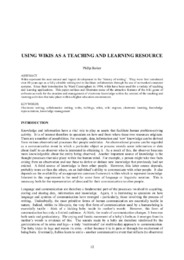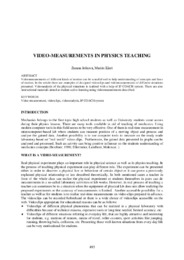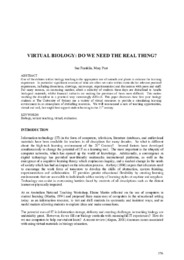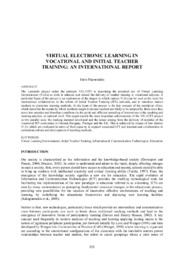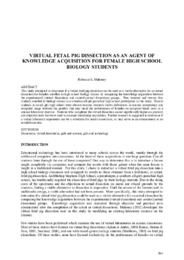Browsing Computer Based Learning in Science (CBLIS) by Title
Now showing items 296-315 of 337
-
The use of I.C.T. in the teaching of kinematics at post-secondary level – a case study
(Department of Educational Sciences, University of Cyprus, 2003)This paper is meant to probe into the effectiveness of I.C.T. as a teaching resource. An experimental method was adopted as the research design of this study and two groups of students i.e. a test and a control group ... -
The use of information and communication technology in mathematics - a double irony?
(Department of Educational Sciences, University of Cyprus, 2003)When the microcomputer was introduced to schools in the late 1970’s the connection between it and mathematics seemed more than obvious. Educators would have been excused if they thought that technology (and the computer ... -
The use of mind mapping software to improve primary school students’ ability to construct scientific arguments
(Department of Educational Sciences, University of Cyprus, 2003)The purpose of this study was to examine elementary school students’ ability to construct scientific arguments. We set out to analyze students’ arguments in aspects of structure and validity of claims, before and after ... -
Use of questionmark assessment software to improve learning and teaching
(Department of Educational Sciences, University of Cyprus, 2003)Computer aided assessment (CAA) using Questionmark Perception software can be used to enhance learning through the regular use of formative assessment. The range of question styles available within Perception provide good ... -
Using an interactive simulation to enhance procedural skills in grade 5
(Department of Educational Sciences, University of Cyprus, 2003)The discrepancy between what we teach and what scientists and citizens need is greater than most instructors realise. Science for citizenship and science in the technical workplace, both involve greater emphasis on procedural ... -
Using computer simulations to enhance teaching the structure of materials
(Department of Educational Sciences, University of Cyprus, 2003)We discuss computer programs for drawing and analyzing the structure of several types of materials at the atomic level. We begin with simple examples of structure addressed to middle and high school-level students using ... -
Using interactive simulations to enhance Students’ explanations regarding physical Phenomena
(Department of Educational Sciences, University of Cyprus, 2003)The objective of this research was to investigate the effects of Interactive Computer-Based Simulations (ICBSs) on student’s ability to give “scientifically accepted” explanations regarding physical phenomena in Mechanics, ... -
Using midi in music instruction
(Pedagogical Faculty of University of Ostrava, 2001)The contribution deals with practical use of musical format MIDI in singing lessons and in improving the technique of playing musical instruments. Even the practice of one s part in harmonizing with other musical instruments ... -
Using of tips programs packages in engineering education
(Pedagogical Faculty of University of Ostrava, 2001)One of the tasks of higher school is to teach students for creative work. This task equally concerns both to students of natural sciences specialities, and the pupil – “humanities”. In this report the main features of the ... -
Using physical and virtual manipulatives to Enhance conceptual understanding in heat and temperature
(University of Cyprus, 2007)The purpose of this study was to compare the effect of Physical Manipulatives (PM) and the combination of Physical Manupulatives with Virtual Manipulatives (VM) on pre-service teachers’ understanding of scientific concepts ... -
Using real -time graphs to enhance understanding of kinematics graphs: motions detectors in the physics classroom
(University of Cyprus, 2010)The activities and the case study were inspired by publications uncovering a consistent set of student difficulties with graphs of position, velocity and acceleration versus time. Research indicates that the use of a Motion ... -
Using technology in early childhood education: the 100 days of school project
(Department of Educational Sciences, University of Cyprus, 2003)This study has three primary objectives. First, it describes the ways in which six teachers in an urban school environment in New York City integrated technology within a common and familiar theme among lower grade students, ... -
Using the attitude-behavior theory of Reasoned action to understand science teachers' attitudes towards physics, computer simulations and inquiry-based experiments
(Department of Educational Sciences, University of Cyprus, 2003)The purpose of this paper was to investigate how use of an Interactive Computer-Based Simulation (ICBS) prior to performing a Laboratory Inquiry-Based Experiment (LIBE), in a conceptually oriented physics course, affects ... -
Using webct with an off-campus diagnostic ultrasound course
(Department of Educational Sciences, University of Cyprus, 2003)Monash University in Melbourne, Australia, offers a Graduate Diploma in Medical Ultrasound by off-campus distance learning (DL). These DL students are required to study under significantly different circumstances than ... -
Using wikis as a teaching and learning resource
(University of Cyprus, 2007)Wikis represent the next natural and logical development in the ‘history of writing’. They were first introduced over 10 years ago as a fully editable writing tool to facilitate collaboration through the use of networked ... -
Verification of practical skills in an e-course
(2010)eLearning has become quite popular among students, educational institutions and official authorities. Many institutions have decided to employ this study tool in their programs. The eLearning environment enables knowledge ... -
Video-measurements in physics teaching
(University of Zilina, 2005)Videomeasurements of different kinds of motion can be a useful tool to help understanding of concepts and laws of motion. In the article there are examples of designed videoclips and videomeasurements of different situations ... -
Virtual biology: do we need the real thing?
(Department of Educational Sciences, University of Cyprus, 2003)One of the debates within biology teaching is the appropriate use of animals and plants to enhance the learning experience. In particular significant amounts of time are often set aside within curricula for relevant practical ... -
Virtual electronic learning in Vocational and initial teacher Training: an international report
(University of Cyprus, 2007)The Leonardo project under the acronym VELVITT is examining the potential use of Virtual Learning Environments (VLEs) as tools to enhance and extend the delivery of teacher training in vocational subjects. A particular ... -
Virtual fetal pig dissection as an agent of Knowledge acquisition for female high school Biology students
(Department of Educational Sciences, University of Cyprus, 2003)This study attempted to determine if a virtual fetal pig dissection can be used as a viable alternative for an actual dissection for females enrolled in high school biology classes by comparing the knowledge acquisition ...
